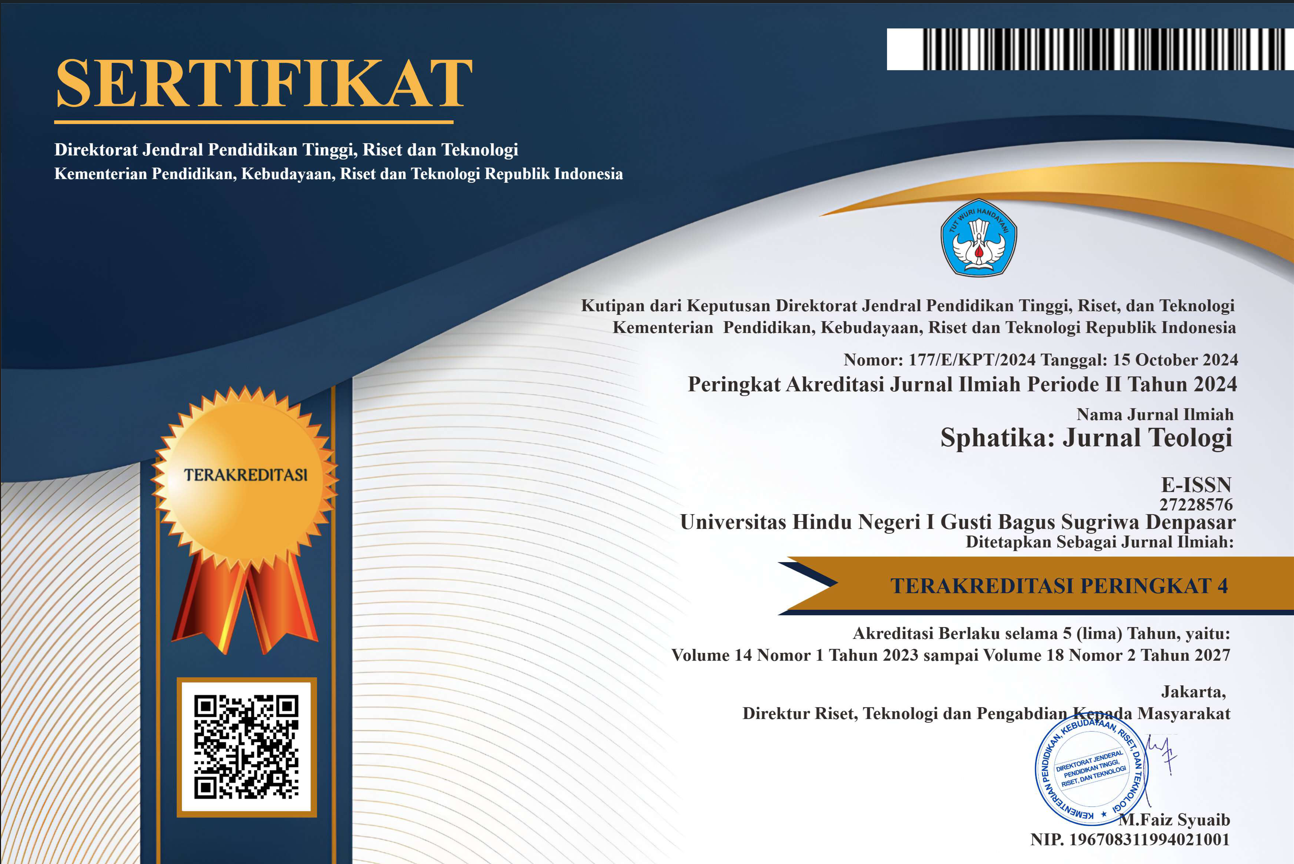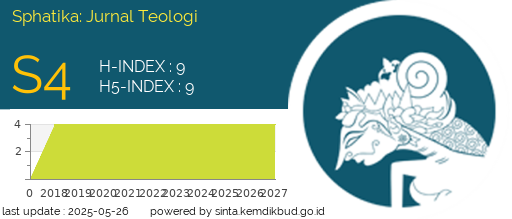Upacara Piodalan sebagai Media Pendidikan Sosial Religius-Ekonomi (Kajian Fenomenologi)
DOI:
https://doi.org/10.25078/sphatika.v13i2.1995Keywords:
Piodalan; religious social education; economics.Abstract
The implementation of the piodalan ceremony at the temple is a symbol of maintaining the religiosity of Hindus as well as bonding the social relations of the Hindu community. Economic cycles in a series of piodalan ceremonies which are symbiotic mutualism also occur between Hindu communities, which in this case is very interesting to study. The results of the analysis show that the piodalan ceremony is a series of remembrance ceremonies to worship the manifestation of Ida Sang Hyang Widhi at a temple or certain places of worship whose implementation is carried out at a predetermined time (every six months or once a year). Religious social education in the piodalan ceremony is strongly felt starting from the process of making ceremonial facilities which are carried out in mutual cooperation, as well as in the ritual process. The piodalan ceremony is also a medium of economic education for Hindus. Some Hindus who are busy with the routines of the world of work who in reality do not have time to make ceremonial facilities will be helped by buying them from productive and active members of the community in the field of providing basic materials for religious ceremony infrastructure. In addition, the piodalan ceremony is a blessing for food and beverage traders around the temple because it is crowded with buyers. Direct economic education will occur because the Hindu community is trained to benefit and prosper one another.
References
Anggraini, Putu Maria Ratih. 2022. Artikel “Cakra Yadnya Di Bali Berkontribusi Pada Perputaran Ekonomi Masyarakat“https://koranbuleleng.com/2022/03/24/cakra-yadnya-di-bali-berkontribusi-pada-perputaran-ekonomi-masyarakat/
Aprilia, dkk. 2019. Artikel Pengaruh Aktivitas Upacara Keagamaan Umat Hindu Terhadap Perekonomian Pedagang Di Pasar Badung. Jurnal Bakti Saraswati Vol. 08 No. 02. September 2019 ISSN : 2088-2149, e-ISSN 1546845501.
Atmadja, Nengah Bawa, dkk. 2017. Bali Pulau Banten Perspektif Sosiologi Komodifikasi Agama. Denpasar: Pustaka Larasan.
Donder, I Ketut. 2007. Kosmologi Hindu. Surabaya: Paramita.
Giri, I Putu Agus Aryatnaya, dkk. 2021. Artikel Prosiding Webinar Nilai Ekonomi Upacara Agama Hindu Di Bali dengan judul “Berkah Ekonomi Di Balik Upacara Piodalan”. Denpasar: IHDN Press.
Hasbullah. 2009. Dasar-Dasar Ilmu Pendidikan. Jakarta: Rajawali Pers.
Kaelan, H. 2012. Metode Penelitian Kualitatif Interdisipliner Bidang Sosial, Budaya, Filsafat, Seni, Agama Dan Humaniora. Yogyakarta: Paradigma.
Kajeng, I Nyoman, dkk. 2010. Sarasamuccaya. Surabaya: Paramita.
Maswinara, I Wayan. 2003. Bhagawadgita. Surabaya: Paramita.
Nala, I Gst Ngurah & Wiratmadja, IGK Adia. 2012. Murddha Agama Hindu. Jakarta: Upada Sastra/ Program Bimbingan Masyarakat Hindu.
Pidada, Manuaba IDM. 2014. Artikel “Makna Upacara Piodalan (Dewa Yadnya)” dalam http://v2.karangasemkab.go.id/index.php/baca-artikel/9/Makna-Upacara-Piodalan-awalDewa-Yadnyaakhir, diakses tanggal 28 Desember 2021
Subagiasta, I Ketut, dkk. 1997. Modul Acara Agama Hindu. Jakarta: Dirjen Bimas Hindu Dan Buddha.
Tim. 2014. Hasil Penelitian Inventarisasi Dan Interpretasi Konsep-Konsep Dasar Serta Praktik-Praktik Agama Hindu. Denpasar: World Hindu Parisad.
Titib, I Made. 1996. Veda Sabda Suci pedoman Praktis Kehidupan. Surabaya: Paramita.
Wiana, I Ketut. 2004. Mengapa Bali Disebut Bali. Surabaya: Paramita
Wiana, I Ketut. 2007. Tri Hita Karana Menurut Konsep Hindu. Surabaya: Paramita.
Wiana, I Ketut, dkk 2013. Swastikarana, Pedoman Ajaran Hindu Dharma. Jakarta: PHDI.
Zayana, Esti. 2007. Nilai-Nilai Pendidikan Dalam Upacara Tradisi Metri Desa Di Desa Limbangan Kecamatan Limbangan Kabupaten Kendal. Semarang: UNS.
















